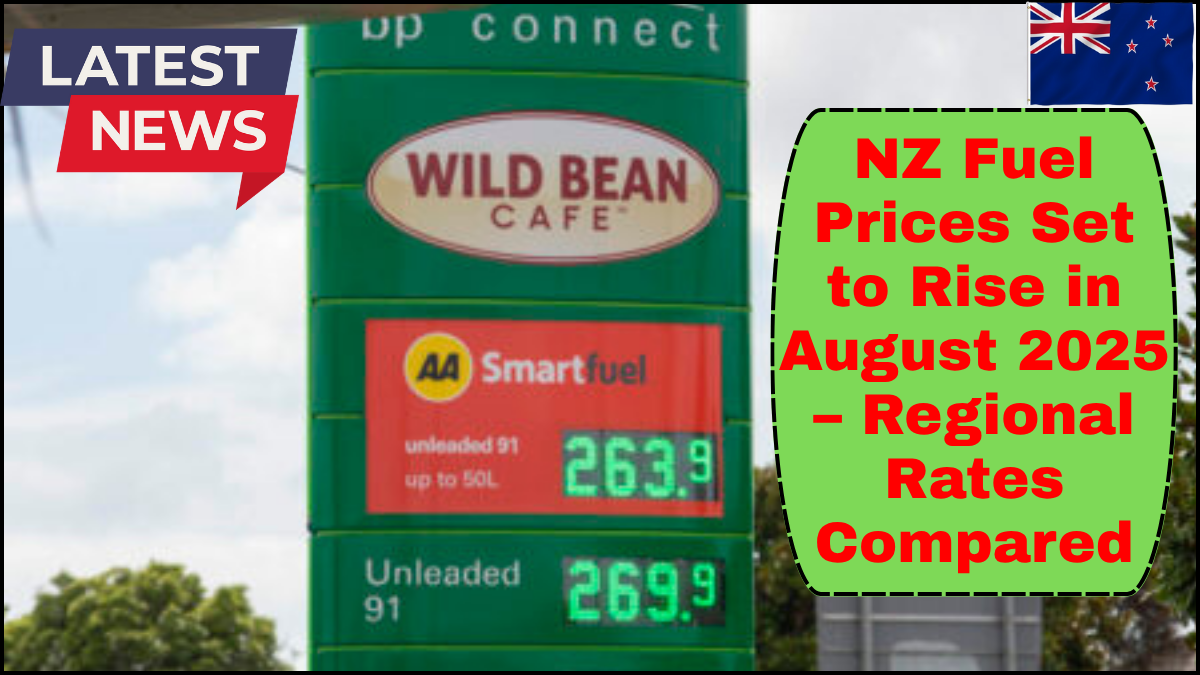New Zealand motorists are bracing for a significant increase in fuel costs, with NZ fuel prices set to rise in August 2025 across the country. The government’s reintroduction of the full fuel excise tax and changes in global crude oil markets are among the primary factors driving this spike. Both petrol price NZ 2025 updates and the diesel rate update are expected to impact households and businesses, particularly in transport and logistics sectors.

In this detailed breakdown, we’ll explore what’s driving the price hikes, compare projected fuel costs across major regions, and examine how the increase will affect everyday Kiwis.
What’s Causing the August 2025 NZ Fuel Price Rise?
The sharp increase in fuel prices stems from a combination of domestic policy shifts and international market trends:
-
Reinstatement of Fuel Taxes: The temporary reduction in fuel excise duty introduced in 2022 to cushion consumers from inflation is scheduled to be fully reversed by August 2025. This alone is expected to add approximately 25 cents per litre to pump prices.
-
Crude Oil Prices Trending Upward: International crude oil prices have been steadily rising due to production cuts by OPEC nations and heightened demand in Asia-Pacific markets.
-
Weakening New Zealand Dollar: A declining NZD against the USD—used to purchase oil globally—has further inflated import costs.
Together, these factors contribute to a surge in the NZ fuel price rise August 2025, with prices forecasted to reach their highest point since 2018.
Regional Breakdown: Petrol and Diesel Prices in August 2025
Fuel prices in New Zealand vary by region due to transport costs, local taxes, and competition among fuel retailers. Here’s what drivers across the country can expect in August:
Auckland
-
Petrol: Expected to hit $3.24/L
-
Diesel: Likely to reach $2.58/L
Auckland drivers will see some of the highest prices nationwide, partially due to the Auckland Regional Fuel Tax, which remains in place.
Wellington
-
Petrol: Estimated at $3.18/L
-
Diesel: Around $2.54/L
Wellington’s hilly terrain adds logistical challenges to fuel delivery, contributing to slightly elevated rates compared to other central regions.
Christchurch
-
Petrol: Forecasted at $3.10/L
-
Diesel: $2.49/L
Christchurch benefits from efficient distribution channels, keeping prices relatively lower than in the North Island.
Hamilton and Tauranga
-
Petrol: Around $3.15/L
-
Diesel: Between $2.50–$2.55/L
Regional growth in these areas has intensified fuel demand, influencing local pricing.
Rural and Remote Areas
Fuel prices in rural communities—such as the West Coast and parts of Otago—may exceed urban averages by 10 to 15 cents per litre due to transport and supply chain costs.
How This Impacts Households and Businesses
With the petrol price NZ 2025 trending upward, the effects will ripple throughout the economy:
-
Commuters may need to reconsider travel habits, carpooling, or shift to public transport to manage costs.
-
Transport and logistics companies will face increased operational expenses, potentially raising the cost of goods across supply chains.
-
Agricultural sectors, which heavily rely on diesel-powered machinery, will feel the pinch from the diesel rate update.
-
Low-income households are expected to experience the greatest financial strain, prompting calls for targeted subsidies or rebates.
Strategies to Mitigate the Impact
Several measures can help soften the blow of the NZ fuel price rise August 2025:
-
Fuel-efficient vehicles: Switching to hybrid or electric vehicles can reduce dependence on fluctuating fuel prices.
-
Bulk fuel purchasing: Businesses may benefit from negotiating fixed-price contracts or purchasing in advance.
-
Government assistance: Advocacy is mounting for temporary fuel rebates or tax credits for essential service workers and rural residents.
FAQs: NZ Fuel Price Rise August 2025
Q1: Why are NZ fuel prices rising in August 2025?
A: A combination of the reintroduction of fuel excise taxes, rising global oil prices, and a weaker NZ dollar are driving the price increases.
Q2: Which region will be most affected?
A: Auckland is projected to have the highest petrol and diesel prices due to regional taxes and higher urban demand.
Q3: Will diesel prices increase as much as petrol?
A: Diesel prices will rise, though typically they remain slightly lower than petrol. The diesel rate update suggests an increase of around 20–25 cents per litre.
Q4: What can consumers do to reduce fuel costs?
A: Options include using public transport, driving less, maintaining vehicles for better fuel efficiency, or switching to EVs.
Q5: Is there any government support planned?
A: As of now, no formal support has been confirmed. However, public pressure may lead to targeted financial relief measures.
click here to learn more